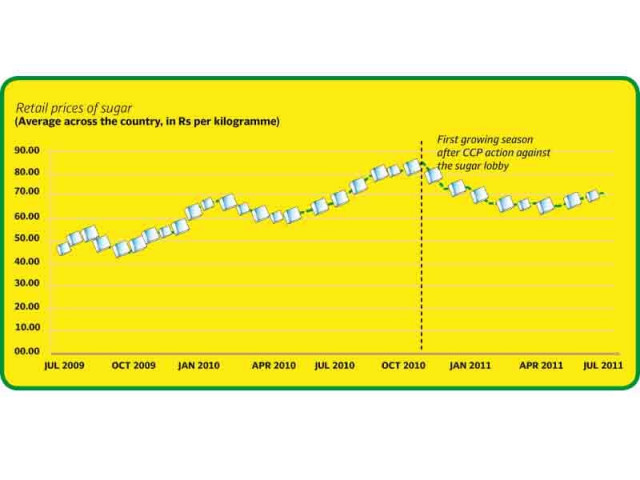Breaking oligopoly: How the Competition Commission helped sugarcane farmers
More than the support price, action against the sugar cartel raised incomes for growers.

The government agency that appears to have done the most to help Pakistani farmers over the past three years does not have any direct relationship to agriculture: the Competition Commission of Pakistan (CCP).
Sugarcane farmers, at least in Punjab, appear to have become new converts to the principles of laissez-faire. Many of the sugarcane farmers who spoke to The Express Tribune say they do not believe that the support price mechanism – where the government sets a price for their crop to ensure that their cost of production and cost of capital are covered – does not end up benefiting them.
Instead, most farmers appear to prefer that government regulators simply ensure that the sugar mills do not form oligopolistic cartels which artificially distort the market in favour of the millers and against the farmers. This is exactly what the CCP tried to do, and judging by some of the results, appears to have at least partially succeeded.
Throughout much of 2009, the Supreme Court had been trying to lower retail sugar prices in Pakistan judicial fiat: simply mandating that one kilogramme of sugar be forced to cost Rs40 per kilogramme. This effort was a colossal failure as the apex court learnt that its jurisdiction does not stretch to the laws of economics. During 2009, sugar prices rose more than 52%, much higher than the annual inflation figure of 12%, according to data obtained from the Pakistan Bureau of Statistics.
Enter the CCP. In September 2009, the CCP began taking action against the sugar lobby, going so far as to raid the offices of the All Pakistan Sugar Mills Association. Based on data obtained from that raid, it published a report in October, detailing collusive practices by sugar mills, designed to force farmers to sell them sugarcane at lower prices, often even lower than the support price.
For much of 2010, the CCP continued to try to break up the politically influential sugar cartel. While no definitive action was taken against any specific mill, anecdotal evidence suggests that much of the cartel-like behaviour of the sugar manufacturers was effectively ended.
By the time the crushing season began in late 2010, retail sugar prices started to fall. The average price across the country fell by nearly 16% during that season, according to data from the PBS. And by the time the next sugarcane harvest rolled around, even farmers were in a position to benefit from the break-up of the sugarcane cartel.
Despite the fact that the Punjab government had announced Rs150 per 40-kilogrammes as the support price for sugarcane, farmers in many parts of Punjab reported receiving as much as Rs230 per 40-kilogrammes (53% higher), largely because the sugar mills were forced to compete for the crop, rather than forming a collusive cartel.
“The sugar mills had to buy the sugarcane at prices higher than the support price,” said Arshad Mahmood, a farmer in central Punjab who sold his crop at higher prices.
Abrar Ahmed, a contractual buyer for sugarcane, said that he often purchased the crop from areas that had higher cultivation of sugarcane and sold it to sugar mills in areas that had a deficit, allowing farmers to benefit.
Meanwhile, overall sugarcane production increased by 12% to over 55 million tons in the 2011 season as more farmers brought land under cultivation for the crop. The average retail price of sugar in Pakistan last month was still 36% lower than its November 2010 peak. And lest anyone feel sorry for the sugar mills, there revenues were up 12.5% and pre-tax profits up nearly 14% for 2011, according to data from the State Bank of Pakistan.
The free market, when backed up by a tough regulator, appears to work well for both farmers and consumers, and does not appear to have harmed manufacturers either.
REPORTING BY IMRAN RANA
Published in The Express Tribune, December 10th, 2012.



















COMMENTS
Comments are moderated and generally will be posted if they are on-topic and not abusive.
For more information, please see our Comments FAQ